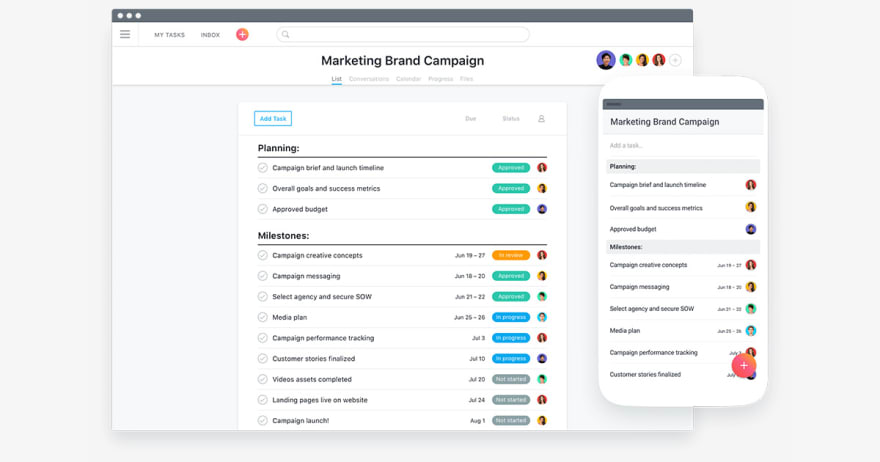This article was originally posted on our blog.
If you’ve ever worked a traditional 9-5 desk job and longed for more flexibility, you know the thrill of landing your first fully-remote job. No longer bound to four walls, your new remote life promises all the best the world has to offer! Traveling. Wearing pajamas all day long. Cool remote work buddies. Endless flexibility.
Choose your own adventure.
Working on the road is a very romantic idea, but there is a tension at the core of doing work while traveling: The qualities that make travel amazing aren’t necessarily favorable to getting work done--and vice versa.
So it’s important to find the best remote work hacks and actively manage your expectations to be successful at working and traveling. You have to strike a balance or you will crash and burn.

The team on our summer camp in 2017.
As fully remote developers and designers, we’re constantly looking for ways to optimize communication, organization, and productivity for remote work. It looks a little different for each of us.
And then there are just the pragmatics: setup, tools, apps, and internal documentation from your company. These are the wrinkles you have to iron out if you want remote work to actually work. Once you get the swing of it, however, working remotely can be awesome.
Whether you’re living out of a campervan in Europe or setting up shop in Thailand for a month, here are some tips from the Bugfender team for how to travel+get work done:
Take some time to be mindful about your overall expectations. To make remote work realistic, you have to make some decisions: How much will I allow myself to explore/do touristy things? How many hours per day do I need to be on the clock? What are the expectations of my employer? Answer these questions ahead of time.
Research how you are going to call, text, and access the Internet while traveling. If you’re planning to stay in a certain country for longer than two weeks, we recommend buying a local SIM card to put in your phone so that you can send texts and make calls locally. (NB You’ll need an unlocked GSM-enabled phone.) This helpful Prepaid Data SIM Card Wiki has all the information you need to know about the differences between mobile internet vs. WIFI, finding SIM cards for a mobile modem (and/or an unlocked phone), country guides, and much, much more.
MiFis: Local SIM cards vs. international data. To access the Internet remotely, you have a couple different options depending on where you’re going and your needs. In some countries, it will be cheaper to buy a local SIM with prepaid data and tether your computer to your phone as a mobile hotspot using local data. (The main downside of using your mobile as a hotspot is that it will rapidly zap your battery, so you will need to be prepared.) For frequent travelers who want a more universalized, international option, you can use this wiki to compare options such as GlocalMe or Skyroam Solis. You can rent mobile routers with international data, but the wiki discourages it because of frequent problems with the fine print. Getting a local SIM and running a hotspot through your phone will most likely be the least expensive option (depending on country). Again, refer to the wiki.
If you are using data to connect to the Internet, invest in TripMode. This app allows you to monitor and control each app’s Internet usage, so you can choose which apps can access data and limit consumption. Mobile mode for browsers saves so much data, which will save you so much money.
When booking hotels or vacation rentals, look for wifi and work areas; always have a backup plan (see points #2-3). We can all recognize that on the whole, hotel wifi is typically very bad. Consider carrying an ethernet cable and adapter just in case connecting to the ethernet connection is faster in a hotel or an Airbnb.
Productivity: Recognize that doing work will be non-negotiable. In other words, if you’re committing to work on the road, don’t give yourself a choice about actually doing the work. Zen Habits author Leo Babauta says:
“The hard part comes when we say, ‘Should I do this now or not?’ and then we realize we have tons of other options, like checking social media and reading the news and sending pictures to people and looking at cat or robot photos online. What has worked for me is telling myself there is no option. Work is something I’m going to do, non-negotiable, just like I’m going to do the basic duties of being a parent, without question. I have felt temptation to let myself off the hook, but then I shake off that temptation and just do it. Giving myself a choice would lead to pretty bad results.”
- Having a virtual office can help you feel connected to your team. Maybe this point goes without saying, but you’ve got to stay connected. You can’t go radio silent. Plan to use whatever app your team uses to communicate: Slack, Google Hangouts, HipChat, GroupMe, etc. If you hate group messages, you will have to overcome that dislike in order to work remotely.
Make sure the team is on the same page. Consider using project management software like Trello or Asana. If you want remote work to be sustainable, be upfront about communication. If you start to feel disconnected, talk to your manager/team about how to increase communication. Everyone on the team should be able to view projects, share info, and stay updated in real time.
Be sure you know the protocol. Remote developers in particular need to know expectations about committing changes to version control, leaving notations, tracking time, and division of duties. We use Jenkins to keep our remote team agile so that we don’t waste time trying to compile code from multiple commits to version control. At the outset, we talk about the expectations for how our developers should work together.
Learn to manage your time wisely. The money question of working remotely seems to be: “How do I keep focus and not watch youtube videos/stalk my ex on Facebook/research conspiracy theories/waste valuable work time looking at cat memes?”
Everyone responds differently to various approaches, but here are a couple ideas:
- If you don’t currently have any structure at all, try time blocking the old fashioned way. It is oddly satisfying and will improve your efficiency if you combine it with self-control. Just block off sections of your calendar for each job. Don’t allow yourself to do mindless surfing during time you block for other tasks.
- Toggl has an app that allows you to time block, track time, and quantify how you spend your time so that you can know where you waste time and improve efficiency. Harvest is also helpful.
- If you want to block certain sites that you compulsively visit or set time limits for data usage on certain sites, consider using an app such as Focus Me.

The Roost stand, a back saver for remote workers.
Get a Roost stand to prevent bad posture. As you travel, you probably won’t have access to optimal office spaces. Perhaps you’ll be in a tiny Airbnb studio or sitting around a kitchen table in South Africa with your team. The Roost stand is ultra lightweight and packs down small. It works by elevating your laptop to a decent height so that you don’t hunch over your computer while working. It does wonders for your back. (Here’s more on setting up an ergonomic workspace.)
Focus more on your energy levels than on actual time. As you travel, you will notice that you will have changing energy levels due to jetlag, road fatigue, and adjusted sleeping habits. Pay attention to your most productive times of day, and use those to your benefit. At home, you may be most productive in the early morning, but on the road you may find that midday is a better time to do your best work. Do touristy things outside of this optimal work-energy time.
A good external phone charger is a smart tool to take along with you. No one likes it when their phone dies while touring the Coliseum or Angkor Wat. Have a backup battery for your device in case you need it.
Combat stress by committing to 1-2 rituals on the road. Even if you’re traveling, it may be helpful to set some rituals or structure for yourself. Try meditating for 10 minutes every morning. Take time to make coffee by hand. (You can easily travel with this pour over with a valve to keep things tidy.) Others make a routine of running or doing yoga at a certain time of day to have a ritual for exercising. Whatever it is, pick one or two and implement them to avoid burnout and increase mindfulness.
To create a multi-screen workstation, use Air Display to turn an extra iPad or Android tablet into a second screen. For developers, it can be invaluable to have this option on the road.
Use a VPN for security while using open networks all over the world.
Save yourself and buy a Universal Adapter. Interesting local foods--not your electronics--are best enjoyed fried.
Remember to enjoy yourself, explore some of sights wherever you go, and continue to refine your process to grow as a remote worker.
At Bugfender, we work together from all over the globe. Some of us have permanent residences and work from there, but others live in a van and/or travel constantly.
Though we’re all over the place, we prioritize staying organized. That’s why we decided to build the best remote logger on the market.
We help remote teams get logs from user devices from wherever they are in the world. The entire product is meant to optimize remote development. By integrating our SDK, we’ll collect logs from your users, process them in our servers, and deliver the information to you in a user-friendly console. You can use Bugfender to log all kinds of user data. You can even track, reproduce, and quickly fix bugs on your own device so users will be impressed by how fast you resolved the issue. Learn more.
This post was edited by Sarabeth Flowers Lewis, a freelance writer and co-founder of Lewis Commercial Writing, specializing in SEO and direct response content creation. She currently works remotely with her ginger husband writing for tech, nonprofits, and real estate. See more of her work here.
This article was originally posted on our blog.









Oldest comments (4)
What a advertisement.
Thank you!
Great Post!
I've been using some tools for personal purposes such as Asana to track all the task for different projects, the flexibility we have there to manage item's status and assignees is just awesome.
Good tips.
I worked remotely for almost 10 years. First 6, traveling 3 weeks/month. Last 4, almost exclusively from the home office.
I would say, very important to have a couple of conversations with yourself. Are you truly "self motivated"? Will you get up and get after it every day? Can you set your own deadlines? Are you lingering over your morning caffeinated beverage before heading to your desk, or slurping it down as you review yesterday's work?
Secondly, are you comfortable with spending days at a time in your office, by yourself, with contact through only phone, email, or IM? This actually is a serious question. The reason you're drawn to social media during work time may be because you don't have that over-the-cube-wall chitchat with your mates. You won't have those lunches at the local cafe, nor those over-the-shoulder confabs about why something isn't working. You'll miss the human contact. A surprising (to me) number of very good workers do not handle well being "on their own" all the time.
After I'd been working from home for a few years, I noticed that every time I got on a call with one of my cow-orkers, I would chatter on and on until I recognized that they were struggling to get off the call without being rude. That was my clue to the impact of working alone in my office, day in/day out, week in/week out. And that's although I'm exceptionally introverted; even when working in the cube farm, I'm known to go all day without speaking to anyone else.
"Out of sight, but not out of mind." Your mates may see you checking in/out code, answering emails, and so forth -- but your manager probably won't. Nothing makes managers more nervous than not having line-of-sight on an employee. Very important to insure that management gets word of your deeds, even if you have to utter those words yourself. A periodic check-in call, a 1-on-1 to review what you've been doing, may be a good idea.
And, remember that in the office, if you spend 15 minutes bloviating in the break room, people see you, know where you are and what you're doing. Someone asks, "Where's Mike?" Someone else will answer, "He's in the break room." But, when working remotely, that same 15 minutes spent in your kitchen chatting with your spouse, you're invisible to everyone. Nobody knows where you are.
I've been a consultant now for 15 years. A lot of guys who were much smarter and much more knowledgeable than myself have been left behind in that time. To quote "Dirty" Harry Callahan, "A man's got to know his limitations." If you find yourself singing, "Hello, Walls" after working remotely for a while, pay attention and take the hint. OTOH, if you're tapping your feet to "I'm So Glad," then buy yourself a beverage. After working hours.